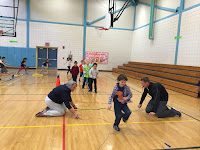Now we will both be the first to tell you that what we now know about parenting is still far outweighed by what we still have to learn, but we do benefit from many lessons learned. Additionally, we have had the distinct privilege of watching our beautiful (if I do say so myself) baby girl grow into the young lady she is today. Only the passage of time has allowed us to look back and see how some of the decisions we made years ago have influenced who she is at ten. We can now see how some of the seeds we planted when she was one, two and three have begun to blossom and support her independence, courage, caring and sense of self. These seedlings of personality are likely to experience periods of drought and other challenges as she heads into puberty, but I feel confident that the roots are strong.
Where work and home meet
As the first four months of this school year come to a close, I can see many parallels to the experiences I had as a new father. In many ways our school started brand new this year. While almost all the staff in the school worked as a part of the district last year, this is the first time that they were all organized together in one school focused on students in grade PreK-2. While this reorganization posed all sorts of logistical challenges, it also created an amazing opportunity to create new traditions, set a focused vision and develop a common set of governing values.Just as I floundered through a sea of uncertainty as a new father, having no experience to draw from, I have felt equally uncertain about my decisions leading the staff through this change. Ten years from now I will be able to look back and see how decisions I am making today will have impacted things yet to come. However, as I sit here today it is very hard for me to measure my impact as a school leader.
Sprouting some roots
Guiding me through my work as a principal have been some fundamental core beliefs about schooling along with my beliefs about leadership. Among my beliefs as a leader is the notion that leaders play an integral role in establishing both the vision for the organization as well as fostering a culture that is both supportive and empowering.If leaders are able to successfully articulate the school's vision through continuous messaging and through their decision making process while encouraging staff to take risks, stretch themselves professionally and be creative, then innovation is possible. If innovation is possible, then the whole school can continue to grow and improve indefinitely.
In the past few months some pretty amazing things have started happening in the school. Before our school year even began, a teacher approached me about creating a whole school project that would
 |
| BOKS Fitness Program |
| Dot Project |
 |
| Holiday Gift Drive |
As we approached the holiday season, a group of staff members organized a holiday gift drive. The gift drive provided gifts for over 25 needy students in our school, supporting our mission to be "a family of learners." This was in addition to a student and police department effort to raise toy donations for Toys for Tots. Very recently our music teacher took our school's mission statement and used it to create a school song. She taught the song to our grade two students and they sang it for the school at a recent whole school meeting.
The Right Climate
Each of the above occurrences were generated by staff members and their successful implementation was all staff driven. They all support the overall vision and mission of our school, helping us to truly stand out as an early learning center focussed on educating children both as learners and citizens.Leaders must foster an environment that encourages staff to try new things, take risks and dream big. People in the organization need to know that their ideas are valued and that they will be supported when they take risks. Additionally, leaders must be clear on the vision so that staff have the big picture and are able to hold their ideas up against it. Lastly, leaders must have the courage to challenge the things that run against the school's vision and mission.
In this type of environment leadership is dispersed to anyone with a good idea. The world's most successful organizations are not that way because one person is able to do all the innovating needed in the organization, lead each innovation project and ensure successful completion. Rather, their successes are due to the collective work of a variety of members in the organization all moving towards the same goals in an environment that encourages them to contribute in meaningful ways. Should school leadership be any different?










